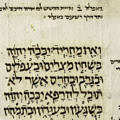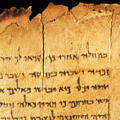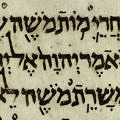Le mot hébreu ḥèsèd (חֶ֫סֶד) revêt dans la Bible un sens profond que les versions françaises peinent à saisir. On le trouve ainsi traduit tantôt par miséricorde, fidélité, amitié, faveur, bonté, loyauté, amour, grâce, etc.
Mais que signifie-t-il vraiment ? Et quelles en sont les implications théologiques ?
Rendez-vous jeudi 15 septembre à 11h pour ce nouveau cours de Master 2 à Strasbourg !
 En
En Fr
Fr






Bonjour
Où peut on voir cette conférence sur la hesed ?
Ce cours n’a pas été enregistré, désolé ! 😉
Bonjour,
Avez-vous publié depuis vos analyses sur « hesed dans la bible hébraïque » dans un article ou livre?
Sinon, y aurait-il moyen de lire votre analyse pour ceux qui ont raté votre cours de 2011 (et n’habitent pas Strasbourg)?
Bien cordialement,
Non, je n’ai pas publié ce cours, et il n’a pas été enregistré. Merci de votre intérêt pour mes travaux 😉
Re-bonjour!
Toujours pas publié? (sur Hesed)?
Je ne parle pas l’hébreu ancien, mais je note que dans la traduction anglaise du Talmud, le terme hesed est présenté, dans le passage ci-dessous, comme équivalent à gemilut hasadim, lequel est traduit par « bonté aimante » (loving kindness), Je trouve le terme plus séduisant que « miséricorde » ! Pensez-vous que ce soit acceptable comme traduction?
R. Elazar stated: Greater is he who performs charity than [he who offers] all the sacrifices, for it is said, “To do charity and justice is more acceptable to the Lord than sacrifice” (Proverbs 21:3). R. Elazar further stated: Acts of loving kindness (gemilut hasadim) are greater than charity (tzedakah), for it is said, “Sow to yourselves according to your charity (tzedakah), but reap according to your hesed” (Hosea 10: 12); when one sows, it is doubtful whether he will eat [the harvest] or not, but when one reaps, he will certainly eat. R. Elazar further stated: The reward of charity depends entirely upon the extent of the kindness in it, for it is said, “Sow to yourselves according to charity, but reap according to the kindness.” Our rabbis taught: In three respects gemilut hasadim is superior to charity: charity can be done only with one’s money, but gemilut hasadim can be done with one’s person and one’s money. Charity can be given only to the poor, but gemilut hasadim both to the rich and the poor. Charity can be given to the living only, gemilut hasadim can be done both to the living and to the dead. TB Sukkah.49b.11.
Bonjour, connaissez-vous l’essai de Michael Card « INEXPRESSIBLE », HESED and the Mystery of God’s LOVINGKINDNESS »?
L’avez-vous lu? Est-ce de bonne qualité?